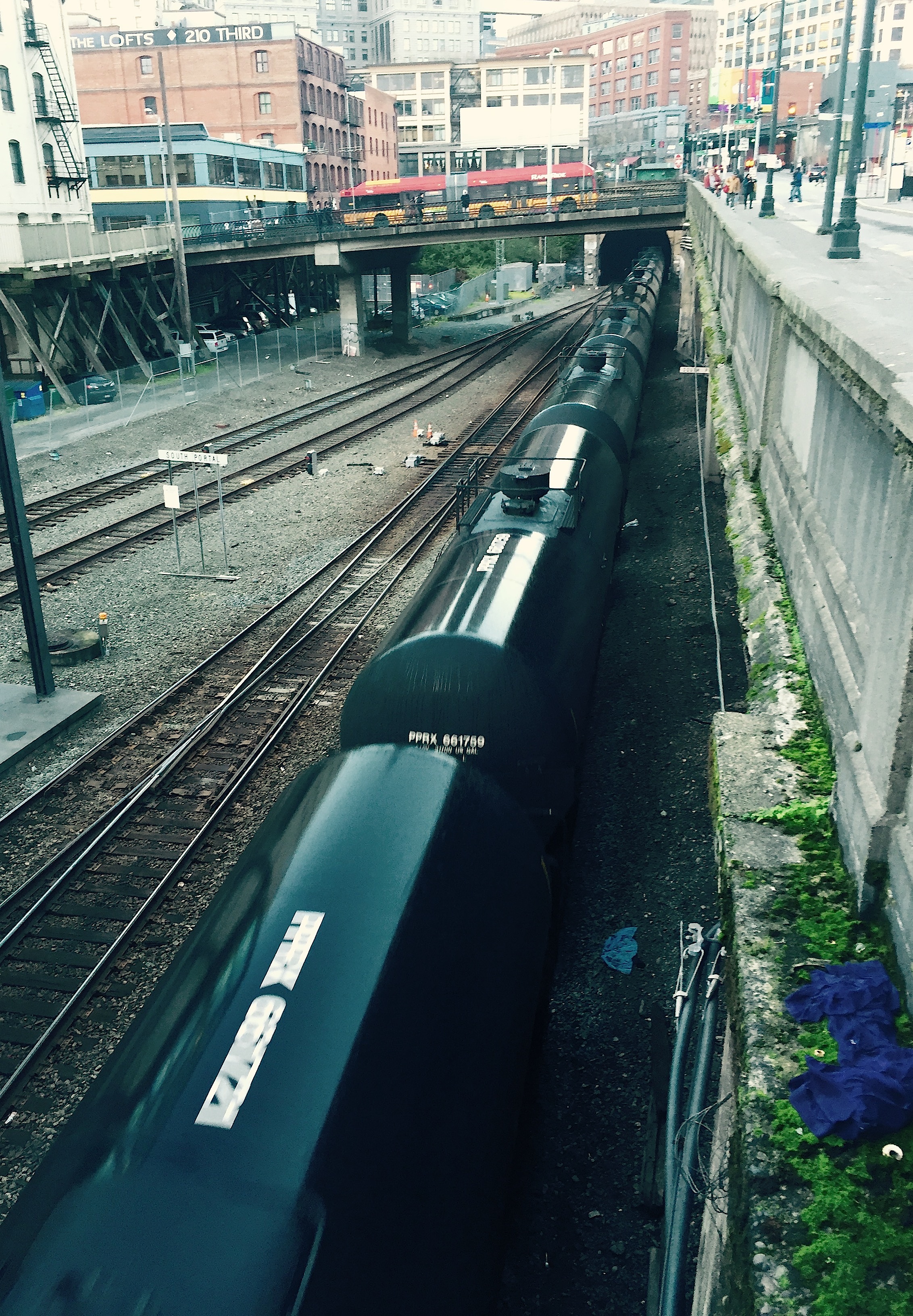On a gray morning in September 2014, a mother, a cafe owner, two teachers, and a co-founder of Climate Solutions set up a blockade in front of a parked oil train at the BNSF Delta rail yard in Everett. After eight hours locked to an 18-foot metal tripod they’d erected over the tracks, they were arrested and spent the next 24 hours on thin mattresses in separate cells at the Snohomish County Jail.
Charged with second-degree criminal trespass and blocking or delaying a train–two misdemeanors–their jury trial officially begins today at the Snohomish County South District Court in Lynnwood. They expect a packed courtroom, including a documentary crew and dozens of climate activists, and hope to make some serious history, as their pro-bono lawyers have gotten the official go-ahead from Judge Anthony E. Howard to use what’s called “the necessity defense.” It’s an area of law that excuses criminal action if the defendant was doing so to avoid greater harm. For the first time in a U.S. courtroom, that argument will include the greater harm of climate change.
Only once has such a defense ever been successful: In 2008, Greenpeace activists were cleared of property damage charges to a coal-fired power plant in southeast England.
But the five defendants, each facing up to two months in jail and $2,000 in fines, are confident. They’ve dubbed themselves “The Delta 5,” which sounds a lot like the next hot series on Netflix. They’ve already made a snazzy website and a mini-doc about their case; they’ve got the attention of the media and climate groups and Seattle City Councilmember Mike O’Brien; and members of the east coast-based Climate Disobedience Center will be in attendance, too—a group co-founded by environmental activists who almost used the necessity defense in 2013 for blocking a shipment of coal before the charges were dropped.
The Delta 5 plans to bring a hefty list of expert witnesses to the stand to testify on their behalf, including several who’ll make a case for the public safety concerns surrounding oil trains, as well as climate impacts.
“It’s not our expectation that we’re going to jail,” says Delta 5 member Patrick Mazza. But “we’re ready if we need to.”
Mazza has been a professional climate activist since 1998 and the only member of the Delta 5 who’s choosing to represent himself at trial. “I was in early on this issue. I’ve seen a lot of progress. But still, we’re not moving fast enough.”
The choice to start breaking laws for the cause was based on frustration.
“I’ve worked on major research projects. I’ve worked on legislative campaigns. I’ve worked on major stakeholder consensus projects. In terms of advancing through the political system, we haven’t made much progress since the mid 2000s. Even in our own state, the petroleum industry owns the Senate,” Mazza says.
That, in no so many words, is part of the reason that Gov. Jay Inslee took carbon emissions reductions into his own hands and ordered the Department of Ecology to develop a carbon cap using its authority under the Clean Air Act, instead of trying, and likely failing, once again, to push a climate bill through the legislature. The Department of Ecology is developing that rule right now and plans to have a draft together by this summer. So far, it looks like the state’s biggest emitters will be required to slash their carbon by 5 percent per year starting as early as 2017. Some will get a few extra years to develop their carbon reduction plan, and all will have the opportunity to get creative with the rule, by funding carbon-reduction projects and buying offsets from the California cap-and-trade market.
To Mazza, this sounds promising, but he’d prefer to see a much more radical transformation – something on the scale of American mobilization at the start of World War II. “We’re going to have to build solar panels like we built B-17 bombers,” he says. “It’s not a business as usual world anymore.”
Much like the eight kid plaintiffs who sued Washington state for failing to protect them from climate change, the Delta 5 want to make a splash in court, regardless of the outcome (though clearly, “not guilty!” is the idea, says Mazza, laughing). They believe that this kind of thing is one of many high-profile public stunts needed to make extreme action on climate change a priority. There are currently six new oil-by-rail terminals or expansion projects proposed in Washington right now, and the recent federal vote to lift the United States’ four-decade export ban on crude oil means that domestically produced fuels will no longer be limited by domestic refining capacity, and the Pacific Northwest is likely to see more oil trains heading for its ports.
The word “Delta,” Mazza adds, is not only a reference to the name of the rail yard that was the site of their stakeout, but also, in scientific circles, the word for “change.”
Sara Bernard writes about environment and education for Seattle Weekly. She can be reached at sbernard@seattleweekly.com or 206-467-4370. Follow her on Twitter at @saralacy.








